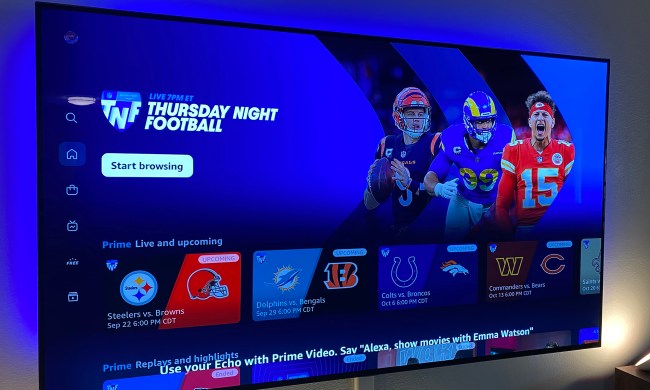For a good many people who watched the inaugural stream of Thursday Night Football on Amazon Prime Video, everything went off without a hitch. The football game was played, and it was absolutely watchable in the Prime Video app. Others, however, saw issues. It was hit-and-miss, as these things tend to be.
And as I predicted last week after the game, Amazon is on it.
On the September 19, 2022, episode of the Sports Media with Richard Deitsch podcast, Thursday Night Football executive producer Fred Gaudelli weighed in a great bit on what it took to start Amazon’s Thursday Night Football from scratch — Amazon is producing it from start to finish and not just streaming someone else’s production — as well a little of what it’s like to be at the mercy of the streaming tech, which we all know is great right up until it’s not.

From the jump, Deitsch noted all the variables that go into troubleshooting this sort of thing. It starts with the source, of course, and then filters through things like content delivery networks, your regional and local internet providers, your local network conditions, and finally your device. That’s no easy thing to troubleshoot from afar.
“People’s experiences in terms of the product — the streaming product — will be different based on a million different variables,” Deitsch said in his chat with Gaudelli and Pierre Moossa, who directs Thursday Night Football. “Where they live. What their internet connection is. The device they’re watching on. …”
Gaudelli was quick to focus on Amazon’s customer service chops before pivoting to the fact that streaming this sort of thing isn’t easy. Indeed, live sports is a completely different animal than video-on-demand, even when you’re working at the relatively smaller scale of a Thursday night NFL game compared to, say, the launch of The Rings of Power, the new Amazon series that’s a spinoff of The Lord of the Rings.
“They’re very customer-oriented,” Gaudelli said. “And I think they’re gonna work like gangbusters to make sure everybody has that great experience. Obviously, there are so many factors outside their control — where do you live, what is your Wi-Fi like, what is the bandwidth? Who else is using it in your area? But they’re very consumer- and customer-drive, and I’m very hopeful that every week this is going to be less and less a thing.”
Obviously, Amazon — the same Amazon behind the behemoth Amazon Web Services — monitors things at the global network level. Moossa then gave a brief glimpse into how that sort of troubleshooting goes from the device level.
“They have a whole place that we’re obsessed with called the AVOC,” Moossa said, “which is where they have every single device you can imagine — people monitoring, testing it. They go through every aspect of it. The amount of testing that is done, the amount of focusing on latency so it was the quickest possible experience.”
Both Moossa and Gaudelli noted that they’re completely removed from the end-user experience — their job is to make a broadcast, not actually deliver the bits and bytes to your TV, phone, tablet, or computer. But the company line was fresh, and you could tell they cared about the quality of the stream.
“I realize that some people may not have had a perfect experience,” Moossa continued. “But [Amazon is] so focused on the consumer experience that they’re gonna figure out a way to make sure it’s determined.”
Amazon’s next Thursday Night Football stream is September 22, when the Pittsburgh Steelers head to Cleveland to face their AFC North rival. That game is scheduled for 8:15 p.m. Eastern. To watch it, you’ll need a subscription to Amazon Prime, and then the Prime Video app on whatever device it is you want to watch on.



